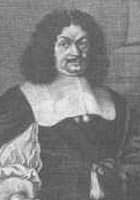Andreas Gryphius
Andreas Gryphius Poems
Du siehst, wohin du siehst, nur Eitelkeit auf Erden.
Was dieser heute baut, reißt jener morgen ein;
Wo jetzund Städte stehn, wird eine Wiese sein,
Auf der ein Schäferskind wird spielen mit den Herden;
...
Geboren in der Flucht, umringt mit Schwert und Brand,
Schier in dem Rauch erstickt, der Mutter herbes Pfand,
Des Vatern höchste Furcht, die an das Licht gedrungen,
Als die ergrimmte Glut mein Vaterland verschlungen:
...
Wir sind doch nunmehr ganz, ja mehr denn ganz verheeret!
Der frecher Völker Schar, die rasende Posaun,
Das vom Blut fette Schwert, die donnernde Karthaun
Hat aller Schweiß und Fleiß und Vorrat aufgezehret.
...
So, now we are destroyed; utterly; more than utterly!
The gang of shameless peoples, the maddening music of war,
...
Andreas Gryphius Biography
German lyric poet and dramatist, was born on the 11th of October 1616, at Grossglogau in Silesia, where his father was a clergyman. The family name was Greif, latinized, according to the prevailing fashion, as Gryphius. Left early an orphan and driven from his native town by the troubles of the Thirty Years’ War, he received his schooling in various places, but notably at Fraustadt, where he enjoyed an excellent classical education. In 1634 he became tutor to the sons of the eminent jurist Georg von. Schonborn (1579—1637), a man of wide culture and considerable wealth, who, after filling various administrative posts and writing many erudite volumes on law, had been rewarded by the emperor Ferdinand II. with the title and office of imperial count-palatine (Pfalzgraf). Schonborn, who recognized Gryphius’s genius, crowned him poela laureatus, gave him the diploma of master of philosophy, and bestowed on. him a patent of nobility, though Gryphius never used the title. A month later, on the 23rd of December 1637, Schonborn died; and next year Gryphius went to continue his studies at Leiden, where he remained six years, both hearing and delivering lectures. Here he fell under the influence of the great Dutch dramatists, Pieter Cornelissen Hooft (1581—1647) and Joost van den Vondel (1587—1679), who largely determined the character of his later dramatic works. After travelling in France, Italy and South Germany, Gryphius settled in 1647 at Fraustadt, where he began his dramatic work, and in 1650 was appointed syndic of Glogau, a post he held until his death on the 16th of July 1664. A short time previously he had been admitted under the title of “ The Immortal “ into the Fruchtbringende Gesellsc/zaft, a literary society, founded in 1617 by Ludwig, prince of Anhalt-KOthen on the model of the Italian academies. Gryphius was a man of morbid disposition, and his melancholy temperament, fostered by the misfortunes of his childhood is largely reflected in his lyrics, of which the most famous are the Kirchlzofsgedanken (1656). His best works are his comedies, one of which, Absurda Comica, oder Herr Peter Squentz (1663), is evidently based on the comic episode of Pyramus and Thisbe in The Midsummer Night’s Dream. Die geliebte Dor’nrose (1660), which is written in a Silesian dialect, contains many touches of natural simplicity and grace, and ranks high among the comparatively small number of German dramas of the I7th century. Ilorribilicribrifax (1663), founded on the Miles gloriosus of Plautus, is a rather laboured attack on pedantry. Besides these three comedies, Gryphius wrote five tragedies. In all of them his tendency is to become wild and bombastic, but he had the merit of at least attempting to work out artistically conceived plans, and there are occasional flashes both of passion and of imagination. His models seem to have been Seneca and Vondel. He had the courage, in Carolus Stuardus (1649) to deal with events of his own day; his other tragedies are Leo Armenius (1646); Katharine von Georgien (1657), Cardenio und Celi’nde (1657) and Papinianus (1663). No German dramatic writer before him had risen to so high a level, nor had he worthy successors until about the middle of the 18th century.)
The Best Poem Of Andreas Gryphius
Es Ist Alles Eitel
Du siehst, wohin du siehst, nur Eitelkeit auf Erden.
Was dieser heute baut, reißt jener morgen ein;
Wo jetzund Städte stehn, wird eine Wiese sein,
Auf der ein Schäferskind wird spielen mit den Herden;
Was jetzund prächtig blüht, soll bald zertreten werden;
Was jetzt so pocht und trotzt, ist morgen Asch und Bein;
Nichts ist, das ewig sei, kein Erz, kein Marmorstein.
Jetzt lacht das Glück uns an, bald donnern die Beschwerden.
Der hohen Taten Ruhm muß wie ein Traum vergehn.
Soll denn das Spiel der Zeit, der leichte Mensch, bestehn?
Ach, was ist alles dies, was wir für köstlich achten,
Als schlechte Nichtigkeit, als Schatten, Staub und Wind,
Als eine Wiesenblum, die man nicht wiederfind't!
Noch will, was ewig ist, kein einig Mensch betrachten.
The Vanity of This World
Look anywhere you will, the Earth is empty show.
What someone builds today, another soon tears down;
Where now a city stands will be a grassy mound,
A place that only shepherds grazing their flocks will know.
What blooms so fair at daybreak, by noon is trampled low;
What bravely struts and strives soon turns to ash and bone;
No substance lasts forever, no brass, no polished stone.
One moment fortune smiles, the next brings bitter woe.
Tales of our mighty deeds like dreams must fade away.
How then should Man—Time's plaything—ever hope to stay?
Oh think, what are those objects we prize beyond compare,
Mere shadows, dust, and wind—all worthless, false and vain;
Field flowers glimpsed in passing and never seen again!
For that which is immortal, no man seems to care.
